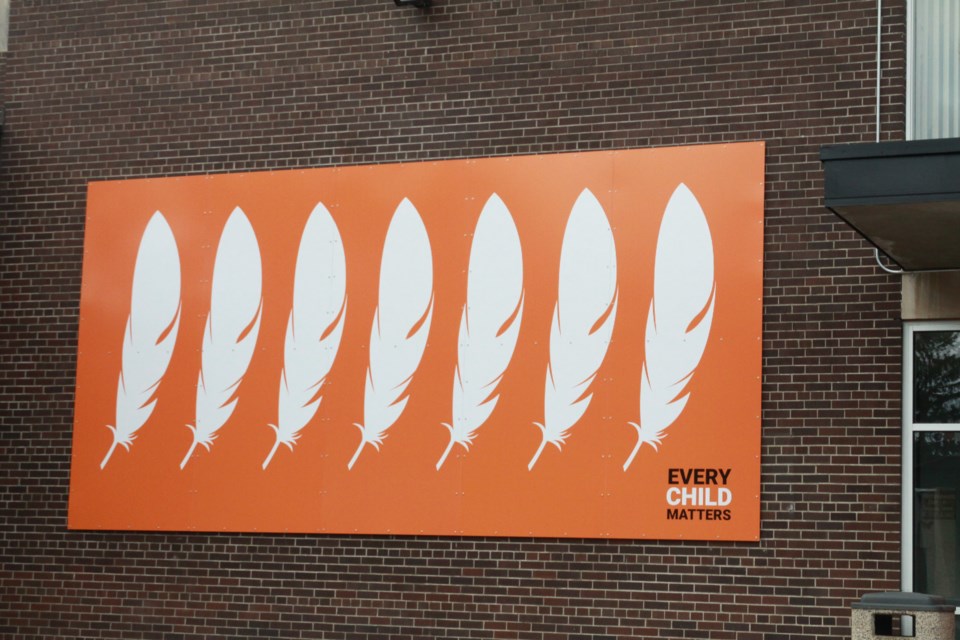THUNDER BAY – Lakehead University raised the National Centre for Truth and Reconciliation (NCTR) Survivors’ Flag during a ceremony that honoured the children lost to the residential school system, survivors and their families, on Friday.
The flag raising was accompanied by an unveiling of an Every Child Matters outdoor art installation.
Denise Baxter, Lakehead University's vice-provost, Indigenous initiatives, said staff want to create spaces for people to have a dialogue to learn from each other and to build things together.
“It's really an important time and we heard a lot today from a couple of speakers about the importance of having this in the curriculum for both children, youth and people in post-secondary.
“Having events like this really does allow for us and our students in particular to have an opportunity to come together, to learn together, to dialogue and really think about what truth and reconciliation means to them,” she said.
Baxter said colonization was not kind to Indigenous Peoples in this country.
“It's really important for people to understand that these things happened and we always need to be mindful so that they don't continue to happen or they don't happen again here.
“Understanding from young children right through to Elders and older adults that, while we have lived through these times, it doesn't mean that we have to continue to live with them,” she said.
“Really allowing people to understand the truth, allowing people to really build empathy for what is happening and how people are still struggling with it. Whether they're survivors themselves, whether they're the extended families of survivors, it's had a really negative impact on all of our lives.”
Faraz Khorsandi, LUSU president, said coming to Thunder Bay as an international student, he was not educated on Indigenous communities or Indigenous history.
“I didn't have any image of what's happened or what's been going on, especially in Thunder Bay, because we have a really rich Indigenous community over here compared to other cities.
“For me, it was a big step . . . especially coming to the role as president. I got to learn about a lot of things that have happened, how we should advocate for them and educate our students.
“It gave me an opportunity to listen to many of our students, listen to many of our lecturers and Elders and see what's been happening and take part in this great initiative to help and empower our Indigenous community,” he said.
Khorsandi said it’s a ‘great move’ by the university to provide resources for students.
“International students don't come with the background since they're coming from different parts of the world.
“Coming to Canada and knowing what the truth is and helping all the community and empower with them, it will help them eventually because we all live in a society, we're part of the society. And if one part of the society is not feeling well or not performing well, then it affects all of us in the grand scheme of things.
“Having that resource, having those opportunities in this university to learn more and to be able to take part and empower Indigenous community is a great initiative.”
Dr. Gillian Siddall, Lakehead's president and vice-chancellor, said the work of truth and reconciliation goes on every day at the university and all over the country.
“It's important to take these moments to come together, to gather and reflect together on what that work means and how far we've come in that work and how far we still have to go.
“I find it very powerful and very moving when that flag gets raised because it is such a beautiful and powerful symbol of truth and reconciliation.
“As many of the speakers said today, truth is so important, really acknowledging the truth of the impact of the residential schools so that we can then engage in reconciliation . . . understanding why we're doing that work given the past,” she said.
Siddall said built into every undergraduate program at Lakehead, students must take at least one course of Indigenous content.
“That was implemented, I'm going to say about 10 years ago now. The way that works at Lakehead is not a single course that everybody takes, (but) every program had to identify a course that would meet this requirement. There are many of these courses. That's something that we're proud of.
“I think that we can go further with that. It is a journey that never ends - and we're always working on that.”
Lakehead University has the Indigenous Initiatives Centre where supports for Indigenous students and Elders are available, Siddall said.
“They often speak to non-Indigenous students as well and help them to understand the impact of residential schools and the work that can be done to heal.”
